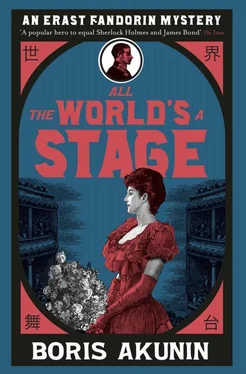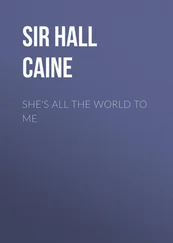‘Point one,’ Andrei Gordeevich began, speaking to the ceiling, as if he could perceive a clear vision of the future up there. ‘In the twentieth century public entertainment will cease to be the domain of entrepreneurs, impresarios and other isolated individuals, and will expand into an immense, highly profitable industry. Those industrialists who realise this sooner than others and deploy their efforts more intelligently will occupy the dominant positions.
‘Point two. It was precisely with this purpose in mind that one year ago I and my associate M. Simon created the Theatrical and Cinematographic Company, in which I have assumed responsibility for the theatrical side of things, and he has taken on the field of cinematography. At the present stage M. Simon is looking for film-makers and agreeing terms with distribution agents, buying equipment, building a film factory and renting electric theatres. He has studied all of this in Paris at the Gaumont Studio. Meanwhile, I am helping to make your theatre famous throughout the whole of Russia.
‘Point three. I decided to back Mr Stern because I see his immense potential, which is perfectly suited to my project. Noah Noaevich’s theory of combining art with sensationalism seems to me to be absolutely correct.
‘Point four. I shall tell you how my associate and I intend to combine our two spheres of activity at our next meeting. Some things will undoubtedly seem unusual, even alarming, to you. Therefore, I would like first of all to earn your trust. You should realise that my interests and yours coincide completely, and that brings us to the final point, number five.
‘And so, point five. I state with all due seriousness that my support for Noah’s Ark is no whim or passing caprice. It might possibly have appeared strange to some of you that I have provided the theatre with everything it needs, while making no claim to your proceeds – which I believe to be extremely substantial…’
‘You are our benefactor!’ Noah Noaevich declared. ‘Nowhere in Europe do actors receive such salaries as in our, that is, your , theatre!’
The others started clamouring too. Shustrov waited patiently for the grateful babbling to subside before continuing his phrase from the precise point at which it had been interrupted.
‘…extremely substantial and, I fancy, have not yet reached their maximum limit. I promise all of you, ladies and gentlemen, that, having cast in your lot with the Theatrical and Cinematographical Company, you will forget for ever about the financial difficulties with which actors usually have to contend…’ – more lively hubbub, heartfelt exclamations and even applause – ‘and artistes of the first rank will become very seriously wealthy.’
‘Lead us into the battle, father and commander!’ exclaimed leading man Emeraldov. ‘And we will follow you through hell and high water!’
‘And to prove the seriousness of my intentions – this, in effect, is point five – I wish to take a step that will secure the financial independence of Noah’s Ark for ever. Today I deposited in the bank the sum of three hundred thousand roubles, the interest on which will be credited to you. It is impossible for me or my heirs to take this money back again. If you decide to part ways with me, the capital will still remain the collective property of the theatre. If I die, your independence will be guaranteed in any case. That is all I have to say. Thank you…’
They gave their generous benefactor a standing ovation, with whooping, tears and kisses, which Shustrov bore imperturbably, politely thanking each kisser in turn.
‘Quiet, quiet!’ Stern shouted, straining himself hoarse. ‘I have a suggestion! Listen!’
The actors turned towards him.
In a voice breaking with emotion the director announced:
‘I suggest that we make an entry in the Tablets! This is a historic day, ladies and gentlemen! Let us record it thus: Today Noah’s Ark has acquired true independence.’
‘And we shall celebrate every sixth of September as Independence Day!’ Altairsky added.
‘Hoorah! Bravo!’ they all shouted.
But Shustrov asked the question that had occurred to Fandorin.
‘What are the “Tablets”?’
‘That is what we call our holy book, the prayer book of the theatrical art,’ Stern explained. ‘Genuine theatre is unthinkable without traditions and ritual. For instance, after a performance we always drink a glass of champagne each and I conduct a critique of each artiste. On the day we made our debut, we decided that we would record all important events, achievements, triumphs and discoveries in a special album entitled “The Tablets”. Each of the artistes has the right to record in the Tablets his or her own epiphanies and exalted thoughts concerning our craft. Oh, it contains many items of very great value! Some day our Tablets will be published as a book that will be translated into many languages! Vasya, hand them to me.’
Gullibin went over to a marble plinth with a large, luxurious, velvet-bound tome lying on it. Erast Petrovich had presumed that it was a stage prop from some production, but in reality it was the prayer book of the art of theatre.
‘There,’ said Stern, starting to leaf through the pages covered in various styles of handwriting. ‘For the most part, of course, I’m the one who does the writing. I expound my brief observations on the theory of theatre and record my impressions of the performance that has just been given. But the others write quite a lot of valuable material too. Listen, now. This is Hippolyte Emeraldov: “A performance is like an act of passionate love, in which you are the man and the audience is the woman, who must be roused to ecstasy. If you have failed, she will remain unsatisfied and will run off to a more ardent lover. But if you have succeeded, she will follow you to the ends of the earth.” There you have the words of a true hero and lover! That is why his admirers are howling outside the windows.’
The handsome Hippolyte bowed ostentatiously.
‘There are witty observations here too,’ said Stern, turning another page. ‘Look, Kostya Shiftsky drew this. And the caption above it reads: “And Noah went in, and his sons, and his wife, and his sons’ wives with him, into the ark, because of the waters of the flood. Of clean beasts, and of beasts that are not clean, and of fowls, and of every thing that creepeth upon the earth, there went in two and two unto Noah into the ark, the male and the female.” And we are all represented with very fine likenesses. Here I am with my progeny, Eliza and Hippolyte, here are our grande dame and Sensiblin as noble beasts, here are the cattle – Kostya himself and Serafima Aphrodisina – here are our villain and villainess creeping upon the face of the earth, here are the fowls – Vasya as an eagle owl and Zoya as a humming-bird – and Nonarikin is shown as the anchor!’
Shustrov examined the caricature with a serious air.
‘There is another promising genre in cinematography – the animated drawing,’ he said. ‘It is little pictures, but they move. We shall have to take that on as well.’
‘Hey, someone give me a pen and an inkwell!’ Noah Noaevich ordered, and he started solemnly tracing out characters on an empty page. Everyone clustered together, looking over his shoulder. Fandorin walked across too.
Printed out in capital letters at the top of the page were the words: 6 (19) SEPTEMBER 1911, MONDAY.
‘Independence Day, made possible by the phenomenal generosity of A. G. Shustrov: to be celebrated every year!’ Stern wrote, and everyone shouted out ‘Vivat!’ three times.
They were about to throw themselves on their benefactor to kiss and hug him again, but he beat a nimble and hasty retreat to the door.
Читать дальше









